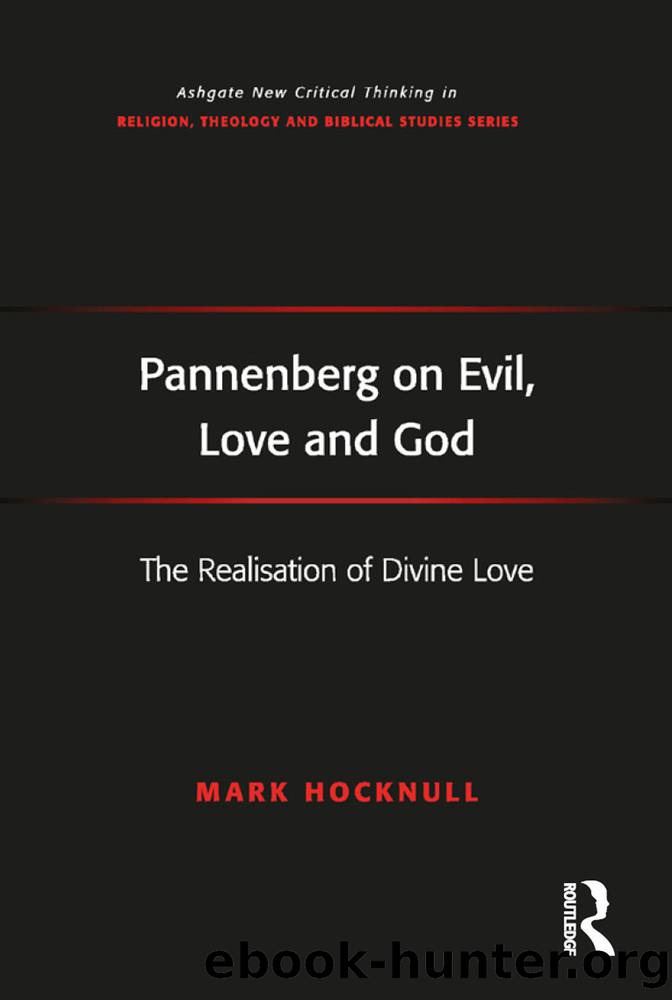Pannenberg on Evil, Love and God by unknow

Author:unknow
Language: eng
Format: epub
Publisher: Taylor & Francis Group
Published: 2002-08-15T00:00:00+00:00
Chapter 4
The Power of Love
DOI: 10.4324/9781315599342-5
The previous two chapters have considered the understanding of the place of evil in the world in Pannenbergâs theology. It was argued that evil is a necessary part of the creation, part of the cost entailed in the act of creation. It is a cost that the Creator is willing to accept. Inevitably, this raises questions about the nature of God and the nature of divine love in particular. This and the following chapter seek to address these questions: first, through a discussion of the nature of God as love in this chapter; in Chapter 5, the focus shifts to Godâs action in the world through Christ to overcome evil, where it will be argued that the âcareerâ of Christ is the proleptic enactment in time of the eschatological fate of the whole world.
In the Dialogues Concerning Natural Religion, David Hume places into the mouth of his sceptical character Philo the classic formulation of the problem of evil for the Christian theologian. God is either impotent or malevolent.1 Philo, and hence Hume, does not regard these questions and their answers as an argument against the existence of God, but as pointing to an elucidation of the character of God. In this, he is similar to Ivan Karamazov in Dostoyevskyâs The Brothers Karamazov. 2 Specifically, they challenge the idea of a loving God. Philoâs conclusion from his reflections upon the presence of evil in the world is that the true source of all things is indifferent to the presence of evil in the world.3 This could, of course, be taken to mean that the universe originates from an entirely a-personal source. Philo, however, goes on to challenge the assumption that the moral rectitude of the Supreme Being is analogous to human moral rectitude. This suggests that what Philo has in mind, when he speaks of the indifference of the origin of the universe to the state of the universe is that this origin is indeed personal, but that what this being considers important is of a wholly different order to that of human beings: what is of concern to us is of no consequence to the Creator. This raises a number of questions for the Christian theologian. If the Creator is indeed indifferent to our plight, why was the world created at all? What is the nature of the relationship of the creation to the Creatorâs purposes? Is it possible to speak of Godâs love at all? If the origin of the universe is indifferent to the universeâs state, then surely the only sensible response is one of indifference to such a Creator. Philoâs triad owes much of its contemporary popularity to J.L. Mackieâs 1955 paper âEvil and Omnipotenceâ.4 Three years before Mackieâs paper, W.T. Stace had already declared that Hume was right: Philoâs charge had never been answered and never could be answered.5 However, as the result of the work of Nelson Pike and Alvin Plantinga, most analytical philosophers of religion claim that this so-called âlogical problem of evilâ has been solved.
Download
This site does not store any files on its server. We only index and link to content provided by other sites. Please contact the content providers to delete copyright contents if any and email us, we'll remove relevant links or contents immediately.
| Baha'i | Cults |
| Demonology & Satanism | Eckankar |
| Egyptian Book of the Dead | Freemasonry |
| Messianic Judaism | Mysticism |
| Scientology | Theism |
| Tribal & Ethnic | Unitarian Universalism |
The Four Agreements by Don Miguel Ruiz(6765)
Breaking Free by Rachel Jeffs(4218)
The Hatha Yoga Pradipika (Translated) by Svatmarama(3342)
120 Days of Sodom by Marquis de Sade(3275)
Member of the Family by Dianne Lake(2352)
The Tao of Physics by Fritjof Capra(2276)
The Psychedelic Gospels: The Secret History of Hallucinogens in Christianity by Jerry B. Brown(2158)
The Road to Jonestown by Jeff Guinn(2066)
Going Clear: Scientology, Hollywood, and the Prison of Belief by Lawrence Wright(1985)
Going Clear by Lawrence Wright(1968)
Uriel's Machine by Christopher Knight(1899)
The Grand Grimoire: The Red Dragon by Author Unknown(1813)
The Gnostic Gospel of St. Thomas by Tau Malachi(1799)
Key to the Sacred Pattern: The Untold Story of Rennes-le-Chateau by Henry Lincoln(1634)
Animal Speak by Ted Andrews(1626)
The Malloreon: Book 02 - King of the Murgos by David Eddings(1596)
Waco by David Thibodeau & Leon Whiteson & Aviva Layton(1560)
The New World Order Book by Nick Redfern(1551)
The Secret History of Freemasonry by Paul Naudon(1503)
